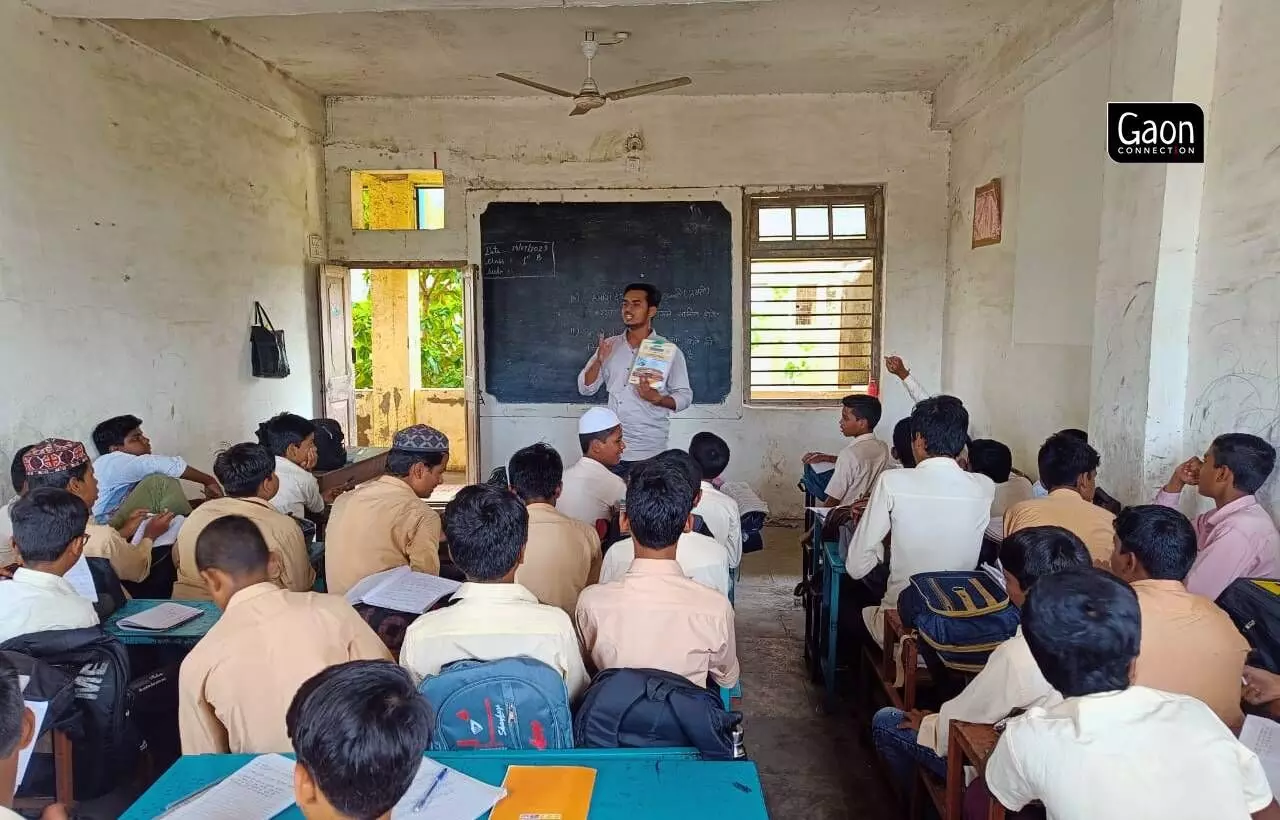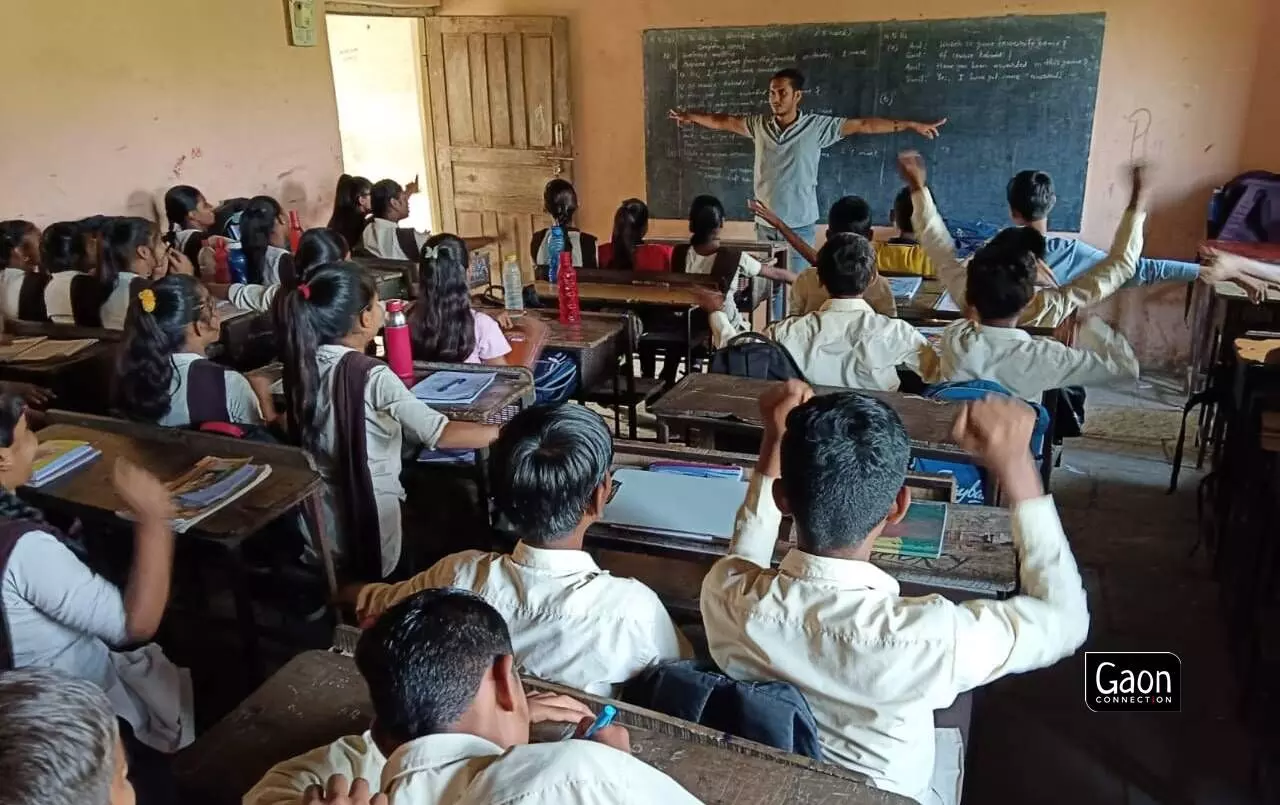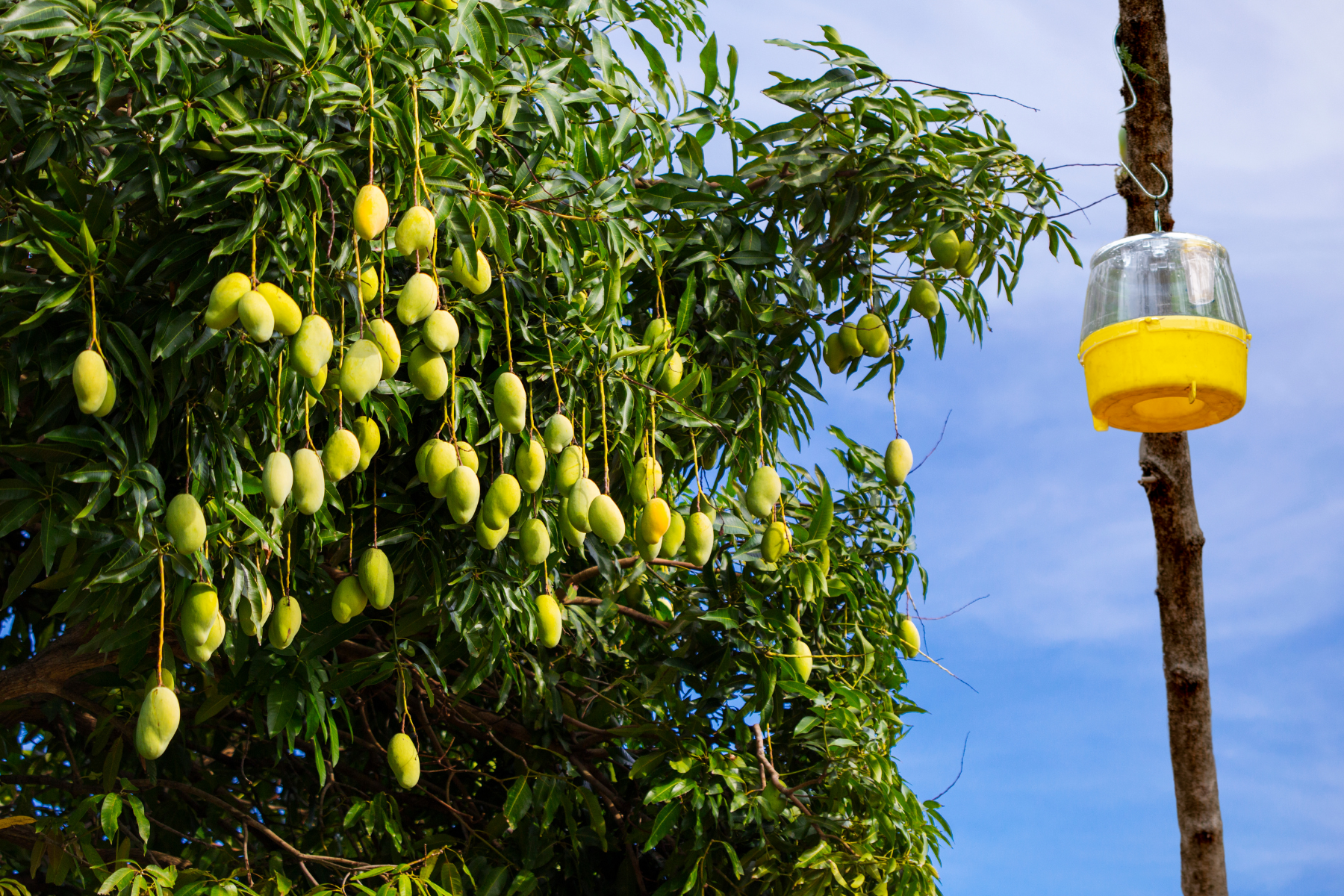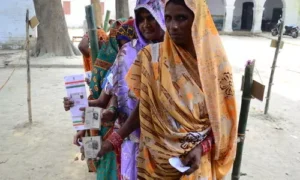Jamshedpur, Jharkhand
More than 4,500 students across dozens of schools in Akola district in Maharashtra are now in the know about the Constitution of India, the backbone of the world’s largest democracy. All due to the efforts of Akash Pawar, a law student, who has been on a mission to teach school children about the Indian Constitution and make them aware of their fundamental rights and duties.
He is doing so by holding ‘Constitution Classes’, as the 26-year old calls them, in the villages and village-level schools in the western state.
“The objective is to empower the students by making them aware of their rights and duties and instil a sense of self-respect in them. I especially focus on the students belonging to the marginalised tribal communities,” he told Gaon Connection.
Pawar himself belongs to the Thakar adivasi community from Maharashtra and is keen to raise awareness among the students from tribal communities.
“At present, we are in 10 schools in Akola teaching 500 students. We train them and they in turn conduct classes on the Constitution for their classmates,” Pawar explained.

More than 4,500 students across dozens of schools in Akola district in Maharashtra are now in the know about the Constitution of India.
The genesis of Pawar’s Constitution Classes lies in what happened to him when he was a teenager. He was in class nine and staying in a students’ hostel, and in his own words, discrimination was nothing new to him as an Adivasi.
“Casteists slurs were a way of life for us. Little did we know then that such the way we were treated was not just wrong but unconstitutional,” Pawar recalled.
Once, when Pawar asked the hostel warden why the Adivasi students were not being served ghee like their non-adivasi counterparts were, the warden became abusive.
“He taunted us saying that as Adivasis who did not even have the means of clothing ourselves, how dare we ask for ghee. A bunch of us beat up the warden and locked him up,” Pawar said. Then, he and his band of followers marched to the District Collectorate and demanded action against the warden.
“The District Collector came out to meet me. He appreciated my activism and encouraged me to fight for my rights. But, he pointed out to me that the way I was going about it was unconstitutional. It was the first time I became aware of the Constitution as something that could guarantee me my rights. It was the collector who made me aware of how important a document the Constitution was for our welfare,” Pawar said.
The District Collector’s words left a profound impact on Pawar. “I realised that all the problems of marginalised communities could be solved if their members were aware of their rights. It was then that I decided to launch a campaign to spread awareness about the Constitution especially amongst the tribal youth,” he said.

Akash Pawar himself belongs to the Thakar adivasi community from Maharashtra and is keen to raise awareness among the students from tribal communities.
So, in 2014, Pawar started a movement called Samvidhan Prachar Lok Sarvad, to teach school children about the Indian Constitution and make them aware of their fundamental rights and duties.
He has a team of seven volunteers who visit the schools in Akola district where they conduct daily classes, usually after the morning assembly.
Pawar shared his journey and what he was doing to spread awareness about the Indian Constitution, at Samvaad, an annual conclave for over 150 tribal communities organised by Tata Steel Foundation in Jamshedpur, Jharkhand in November 2023.
He spoke eloquently about what it meant to be a tribal person. His own experiences in life had shown him that awareness of one’s rights and duties could take tribal communities forward, and ignorance of the same could drag them down.
Is it a level playing field?
Besides holding classes where the students are taught about the nitty gritty of Indian Constitution, Pawar and his team of volunteers through interactive games bring home to the students notions of fair play, equal opportunities, and entitlement.
“A lot of planning goes into planning and creating these activities,” Akshay Raut, a 30-year-old volunteer of Samvidhan Prachar Lok Sarvad, told Gaon Connection. “These games force the participants to think about issues such as privilege and disparity in society,” he added.
One of the things they do is have a race. Everyone starts off at the same time. But, halfway through the race, the participants are stopped and questions are asked of them. These queries are to do with privileges and entitlements.

In the course of his spending time with the students, Pawar also encourages them to go around in their villages and observe what happens in the gram panchayat offices.
“Those participants who can afford to eat at restaurants or whose parents own a vehicle are moved to positions closer to the finish line while those who are not so lucky have to stand further away from the finish line,” Raut explained.
Is it fair that just because one was privileged he or she was given the unfair advantage of moving closer to the finish line?
“This makes the students pause and think. They realise how caste reservations and quotas are justified for the underprivileged. It helps them empathise with their less privileged friends,” Pawar pointed out. “They can see the role privilege plays in life, be it privilege of economics or of caste,” he added.
Pratibha, the 47-year-old principal of JRD Tata School in Akola told Gaon Connection that the constitution classes organised by Akash help the students in developing empathy and sensitivity for others.
“Unfortunately, the education system is such that parents are more concerned about the report cards and marks. Teachers end up focussing on academic performance of the students while matters such as awareness on constitutional rights sometimes takes a backseat,” she said.
“That is why educators like Akash are important. His teaching of the Constitution emphasises on the practical, day-to-day learning about the rights and the duties. I can proudly say that students in my school are far more sensitive towards the less privileged all because of these classes which have been happening in my school for the past one year,” she added.
Manya Kamte, a 12-year-old student of class six at JRD Tata School told Gaon Connection that she enjoys Akash’s classes much more than the regular curriculum-led Civics classes she has to sit through.
“From Akash Sir’s class, we understand the Constitution as something that’s part of our lives rather than just a big, dull book of rules and laws,” Kamte said.

Pawar and his team of volunteers through interactive games bring home to the students notions of fair play, equal opportunities, and entitlement.
Learning about governance
In the course of his spending time with the students, Pawar also encourages them to go around in their villages and observe what happens in the gram panchayat offices.
“This helps them understand how rural administration functions and how grievances are raised effectively. I don’t want any child to experience discrimination,” Pawar added.
“Whenever my students notice unhygienic areas in the village or have to complain about faulty street lights that need to be fixed, they now know where to go and which official to approach. It is a big change. The students also want to know about who their local elected representatives are,” he said.




















